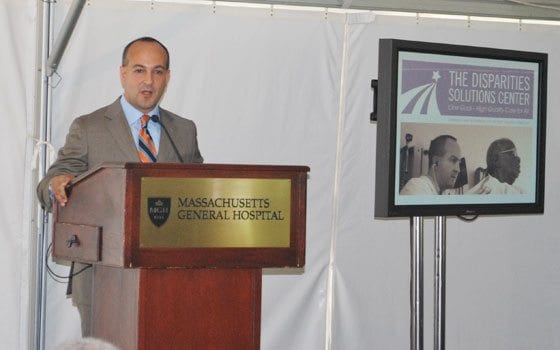
On the month that the Disparities Solutions Center (DSC) at Boston’s Massachusetts General Hospital (MGH) reached its fifth year, Dr. Joseph R. Betancourt, the program director, recalls the case of a Latino patient who did not know he had diabetes.
“He didn’t understand what he needed to do,” Dr. Betancourt explained. “Once he enrolled in our diabetes program and was able to meet regularly with someone who speaks his language, and took small steps that made the difference, his diabetes was in wonderful control.”
Dr. Betancourt has good reason to be proud. He started a program with three employees on his staff that has since grown to include a $3 million budget and national impact.
The DSC was motivated by Unequal Treatment, a landmark report delivered by the Institute of Medicine that revealed striking disparities in the quality of health care services delivered to minority and white patients.
During its five years of existence, the Disparities Solutions Center’s approach has been multi-faceted. From organizing the Disparities Leadership Program, which were workshops targeting hospitals and health plan officials, to addressing medical errors in hospitalized limited-English proficient patients to launching web seminars, the DSC embraced the ambitious task of eliminating health disparities.
“Health disparities can be defeated, but many patients from migrant populations and racial minorities are not able to do it themselves,” said Eddie Horta, a Cape Verdean diabetes coach at MGH, in Chelsea, Mass.
Located in one of the state’s most diverse communities, MGH employs two nurses, a physician, a physical therapist, two mental health specialists and one nutritionist in its disparities solutions effort.
“Simply put, having access to health services helps diminish disparities,” said Leandro Porto, one of the health center’s Portuguese interpreters.
“When migrant patients know there’s someone at the hospital that comes from the same background, they feel less intimidated in accessing care,” Porto added.
Gov. Deval Patrick praised the DSC as a program that sustained the broader definition of community.
“The notion of community I learned in South side Chicago, in the ’50s and ’60s, when every child was in the jurisdiction of every single adult on the block,” Patrick said. “So if you messed up down the street in front of Ms. Jones, she would straight[en] you out as if you were hers. And then call home, so you could get it two times.”
But Patrick also credited Massachusetts Health Reform of 2006 as responsible in bridging the health access gap between white and minority patients.
“Boston’s uninsured rate fell 82 percent, Fall River’s, 76 percent,” Patrick notes. “Universal coverage is closer to reality in the Commonwealth of Massachusetts than anywhere in the United States.”
But the governor said there’s still a lot of work to do. Citing a recent study conducted by the state’s department of Health and Human Services, Patrick said that an African American child born in Worcester is four times less likely to celebrate his first birthday than the average child.
“That’s a moral issue,” Patrick explained. “That’s why I thank you for treating health care as a public good.”
In its early days, the DSC had to prove — even to medical personnel — that the concept of health disparities was something practical to be combated. But after reaching out to diabetic Cambodians in Revere, or Latinos in Chelsea, the program gained momentum and was able to spread its guidelines nationally.
Now, says Dr. Betancourt, the goal is to expand nationally in the next five years.
For Horta, any nation around the globe can replicate this program.
“It doesn’t cost a lot of money and is free for the patient,” Horta said. “You need to have health coaches and the right people at the right place.”






